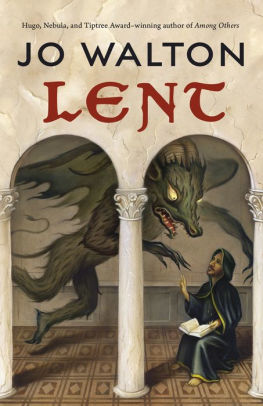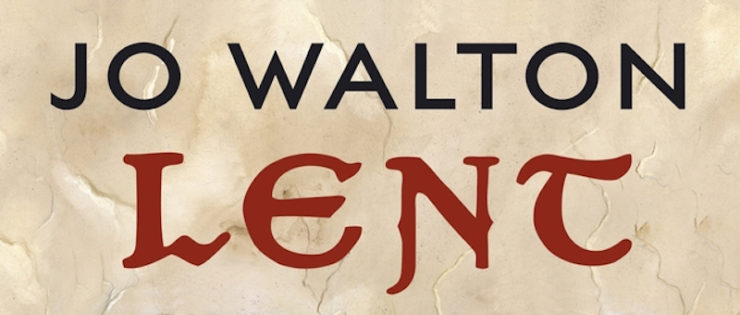Jo Walton has, it must be acknowledged, some significant form in writing philosophical or theological fantasy novels. The Just City, The Philosopher Kings, and Necessity were on the one hand an extended argument with and about Plato and Platonic philosophers across history, and on the other hand, a meditation on divinity, right action, responsibility, and personal change. Lent, her latest novel, is in many respects an extension of several of the thematic arguments (and historical interests) already seen in that Plato’s Republic trilogy, albeit one oddly—given its protagonist—in some ways less theological and more philosophical than those previous novels. Here, the meditation is on damnation and salvation, in the place of divinity, but the argument about right action, responsibility, and personal change remains, seen from different angles, and given different weights.
Lent is also undeniably a love letter to Renaissance Florence and to the Dominican friar, preacher, prophet, and later excommunicate Girolamo Savonarola, who briefly held sway over a “popular” republic in Florence in the closing years of the 15th century while preaching on Christian renewal and universal peace.
And the title is an interesting play on words.
We first meet Brother Girolamo in April 1492, shortly before the death of Lorenzo de’Medici, Lorenzo il Magnifico. Girolamo is blessed with the ability to see and to banish demons, as well as what he believes is the ability to give true prophecy. He’s been called to a convent, along with two of his brother-friars, because the nuns believe themselves troubled by demonic presences. He discovers that the demons are being drawn to an object inside a book, a stone which he takes to keep safe.
The stone’s significance will not become clear until halfway into the novel. Girolamo sets it out of his mind, and after the death of Lorenzo the Magnificent, Girolamo finds himself more involved than a pious and reform-minded holy brother might ever have imagined he would be in the running of the city of Florence, preaching universal peace and a deeply religious—deeply pious—vision of Florentine… democracy, I suppose, though it is not put in exactly those terms. But Girolamo’s religious reformism and charismatic preaching makes him enemies, including the Borgia Pope. And when the political tides turn against the leadership of Florence, Girolamo—placed under a preaching interdict and excommunicated—falls with them. For his execution, he has only the consolation that God might receive him as a martyr.
His death is not the end. I will not tell you why, because that discovery is central to the rest of Walton’s Girolamo’s story. I will tell you that he returns, again and again, to the point where he first meets Lorenzo de’Medici, and tries—again and again—to change the end of his story: to find his way back, as it were, to God.
Buy the Book


Lent
Walton gives us a detailed, atmospheric, deeply believable Renaissance Florence. Girolamo is a fascinating, complex character: driven by faith and compassion, compelled equally by his pride and his humility, both certain and willing to learn. Alongside him, Walton depicts a full cast of individuals—largely drawn from the history of Renaissance Italy—including a version of Pico della Mirandola who is somewhat different from the version of Mirandola that appeared in Walton’s The Just City. Most interesting for me are Girolamo’s relationships with the women with whom he is occasionally in contact: relationships based on shared spiritual or political concerns.
Lent takes place in a very Christian universe, and one where a Christian vision of hell and its demons are a major concern. Its first section (the first “Lent”) looks like it might be a political-historical thriller in shape and form, an alternate history with visible demons. But it transforms into deep character study, as Girolamo’s pride is peeled away, and as Walton engages in an argument about the nature of demons, hell, damnation, history, and change. And, because they are related, the nature of God, free will, and fate.
I’m not convinced that Walton pulls off the conclusion, but it’s a deeply compelling novel, ambitious and kind, and deeply rooted in the intellectual life of the Renaissance. I enjoyed it immensely. And I recommend it—especially for readers who read The Just City and thought, “I want more like this, but different.”
Lent is available from Tor Books.
Read an excerpt from the novel, or discover Jo Walton’s inspiration for the story.
Liz Bourke is a cranky queer person who reads books. She holds a Ph.D in Classics from Trinity College, Dublin. Her first book, Sleeping With Monsters, a collection of reviews and criticism, was published in 2017 by Aqueduct Press. It was a finalist for the 2018 Locus Awards and was nominated for a 2018 Hugo Award in Best Related Work. Find her at her blog, where she’s been known to talk about even more books thanks to her Patreon supporters. Or find her at her Twitter. She supports the work of the Irish Refugee Council, the Transgender Equality Network Ireland, and the Abortion Rights Campaign.











thanks for this review. I can’t wait to read this.
Yes, this book was a pleasant surprise. I didn’t think I wanted to read about demons, but it’s Jo Walton. I shouldn’t have doubted. One of my favorite reads of the year.
Great review. I do, however, think Walton not only pulled off the ending but brought it all the way home. I want to say more, like why I think this, but I’ll restrain myself from spoiling it for others. I’ll say this though: if our society could learn what Walton’s Girolamo learns – to let those whom we most fear speak – we might be much further ahead than we are today.